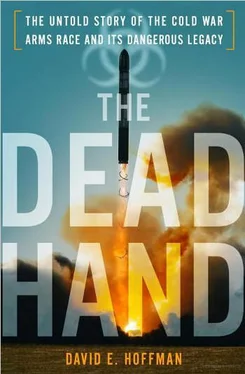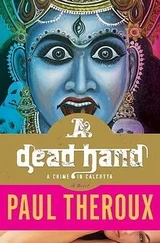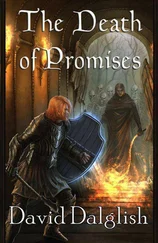43 Baker and Shevardnadze met in Paris, July 16–18. The document, prepared jointly by the United States and Britain, painted a picture of a large-scale Soviet germ warfare program that violated the Biological Weapons Convention. Katayev.
44 “Biological weapons,” the Shevardnadze talking points, in draft and final form; also, agendas for the meetings of July 27 and 30, 1990. Katayev.
45 Eduard Shevardnadze, The Future Belongs to Freedom (New York: Free Press, 1991), p. 72. Nikita Smidovich, his aide for chemical and biological weapons policy, said this refers to what he told Baker about biological weapons.
46 MacEachin, interviews, Feb. 7 and 13, 2006.
47 The negotiations resulted in an agreement the first visits would be January 7–20, 1991.
48 Baker, p. 312.
49 Chernyaev, p. 291.
50 Shevardnadze, pp. 197, 212.
51 Michael Dobbs, Down with Big Brother: The Fall of the Soviet Empire (New York: Knopf, 1997), p. 325.
52 Confidential source.
53 This account of the visits is based in part on confidential sources. Also, Davis interview, Aug. 11, 2005; Alibek interview, June 18, 2007; Alibek’s Biohazard , pp. 193–206; Davis interview by Frontline , “Plague War;” and David C. Kelly, “The Trilateral Agreement: Lessons for Biological Weapons Verification,” Chapter 6 in Verification Yearbook, 2002 (London: The Verification Research, Training and Information Center, 2002), pp. 75–92.
54 Davis said they could see enough, and did not want to risk ruining the whole mission on this point. Davis, communication with author, Nov. 4, 2008.
55 Popov said the man who tried to stop Davis later received a monetary bonus for his effort.
CHAPTER 16: THE YEAR OF LIVING DANGEROUSLY
1 See Yegor Gaidar, Collapse of an Empire , pp. 201–219.
2 Anatoly Chernyaev, My Six Years with Gorbachev (University Park, Pa.: University of Pennsylvania Press, 2000), p. 343.
3 Chernyaev, 1991 g.: Dnyevnik Pomoshchnika Prezidenta SSSR [1991: Diary of an Assistant to the President of the USSR] (Moscow: Terra, 1997), p. 126.
4 Valentin Stepankov and Yevgeny Lisov, Kremlyovskii Zagovor (Perm: Ural-Press, Ltd., 1993), p. 271. Also see Michael Dobbs, Down with Big Brother: The Fall of the Soviet Empire (New York: Knopf, 1997), pp. 336–344; and Anatol Lieven, The Baltic Revolution (New Haven: Yale University Press, 1993).
5 Gorbachev said he had not planned the Vilnius violence, Memoirs , p. 651.
6 Chernyaev, pp. 320–323.
7 Baker sent two papers to Gorbachev via the Moscow embassy. The March 5 meeting and the Baker message are mentioned in an April 5 letter from Major to Gorbachev. Katayev, Hoover. Also, see “Biological Weapons,” no date, Katayev.
8 Katayev, Hoover.
9 Jack F. Matlock Jr., Autopsy on an Empire: The American Ambassador’s Account of the Collapse of the Soviet Union (New York: Random House, 1995), pp. 537— 539.
10 Matlock, Autopsy , pp. 539–541.
11 Chernyaev, p. 352. Matlock also details the misunderstandings in his foreword to My Six Years .
12 Chernyaev, p. 352.
13 Beschloss and Talbott, At the Highest Levels , p. 400.
14 Chernyaev said he, too, had told Gorbachev of rumors about suspicious military movements around Moscow. Gorbachev was “offended” by these signals, he recalled. Chernyaev said the Supreme Soviet speeches of Kryuchkov, Yazov and Pugo had infuriated Gorbachev. Chernyaev, p. 354.
15 This account is based on Matlock, pp. 539–546; and Chernyaev, pp. 352–353.
16 Blair, interview, Feb. 20, 2004; Yarynich interview, April 20, 2003.
17 “On reply to the U.S. President on the question of biological weapons,” July 4, 1991, Katayev, Hoover.
18 At the time, the idea of a “grand bargain” was being floated—massive aid in exchange for true market reform and democracy. But Bush never approved large-scale aid and Gorbachev never got to true market reform. Despite a dramatic appeal for aid to the larger group of Western leaders, Gorbachev failed to secure a major economic package at the summit.
19 Chernyaev, pp. 358–359.
20 “White House Fact Sheet on the Strategic Arms Reduction Treaty,” Presidential Documents, vol. 27, p. 1086.
21 Chernyaev, p. 369.
22 Why this moment? The new union treaty was clearly a factor. However, Gorbachev has also said the hard-liners may have overheard the discussion with Yeltsin about replacing them, which took place at the end of July, in a room at the presidential compound, Novo-Ogaryovo, outside of Moscow. The room was bugged. Gorbachev, Memoirs , p. 643.
23 Gorbachev, The August Coup: The Truth and the Lessons (New York: HarperCollins, 1991), p. 19.
24 Chernyaev, Diary of an Assistant , p. 190.
25 By some accounts, the codes on the suitcase were erased and they were not usable. However, the exact condition is not known.
26 Dobbs, pp. 387–389.
27 Yevgeny Shaposhnikov, Vybor (Moscow: Nezavisimoye Izdatelstvo, 1995), pp. 44–45.
28 Yarynich, communication with author, August 2004.
29 Gorbachev has recalled that on August 27 he came home to find that Raisa was in tears. She had burned all the letters he had written to her over the years. She said she could not imagine someone else reading them if another coup were to happen. Andrei S. Grachev, Final Days (Boulder: Westview Press, 1995), p. 171.
30 Dobbs, pp. 418–420.
CHAPTER 17: A GREAT UNRAVELING
1 Nunn, interview, March 10, 2005.
2 Vinson of Georgia, for decades the chairman of the House Armed Services Committee, was Nunn’s great-uncle. Senator Stennis of Mississippi was then chairman of Armed Services. Another person who influenced Nunn was Senator Richard Russell of Georgia, who had also been chairman of the Armed Services committee. Russell died in 1971 and Nunn was elected to his seat.
3 Kenneth W. Thompson, ed., Sam Nunn on Arms Control (Lanham, Md.: University Press of America, 1987), p. 19.
4 The visit was February 4–17, 1974. Nunn was accompanied by Frank Sullivan of the Senate Armed Services Committee. Nunn, interview, March 10, 2005. Frank Sullivan, interview, Jan. 31, 2006. Also see Nunn, “Changing Threats in the Post-Cold War World,” speech, Monterey Institute of International Studies, Monterey, Calif., Aug. 20, 1995; and U.S. Senate, 93d Congress, 2d Session, April 2, 1974, “Policy, Troops and the NATO Alliance, Report of Senator Sam Nunn to the Committee on Armed Services, United States Senate.” Courtesy of Manuscript, Archives and Rare Book Library, Robert W. Woodruff Library, Emory University, Atlanta, Ga.
5 David Miller, The Cold War: A Military History (New York: Thomas Dunne Books, St. Martin’s Press, 1998), p. 360.
6 Nunn told me the psychology of defeat and its effect on the American military after Vietnam led him to conclude that the Russian military would be demoralized after losing their empire. Nunn, communication with author, Aug. 26, 2008. See Nunn, “Vietnam Aid—The Painful Options,” Report to the Senate Armed Services Committee, Feb. 12, 1975, 94th Congress, 1st Session.
7 In the mid-1980s, Nunn and Senator John Warner (R-Va.) proposed creating risk reduction centers in the United States and Soviet Union to share information in a crisis. The first-phase ideas were accepted by Reagan and Gorbachev at Geneva in 1985, and on Sept. 15, 1987, the United States and the Soviet Union signed an agreement establishing Nuclear Risk Reduction Centers in Washington and Moscow. Nunn and Warner had also suggested a more ambitious effort, which was not adopted. “Outline of nuclear risk reduction proposal,” fact sheet, undated, and “Nuclear Risk Reduction Center,” Cathy Gwin, communication with author, July 28, 2008.
Читать дальше












